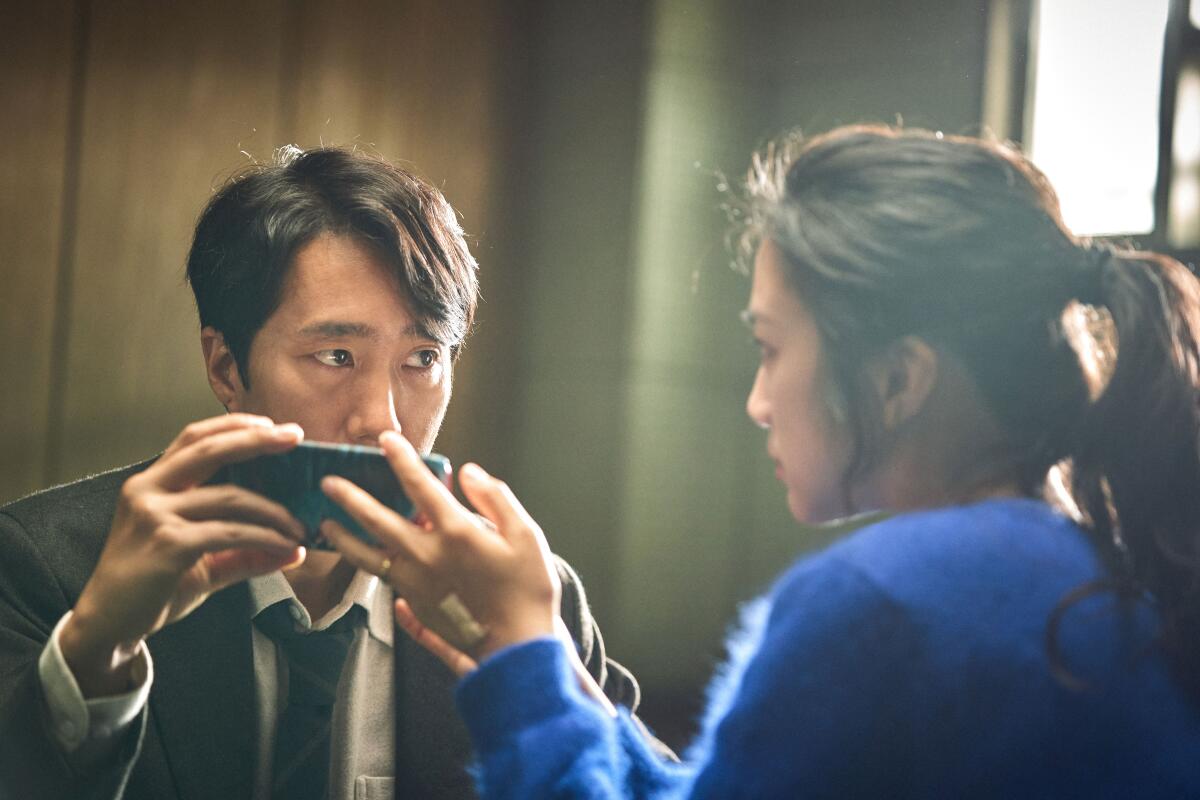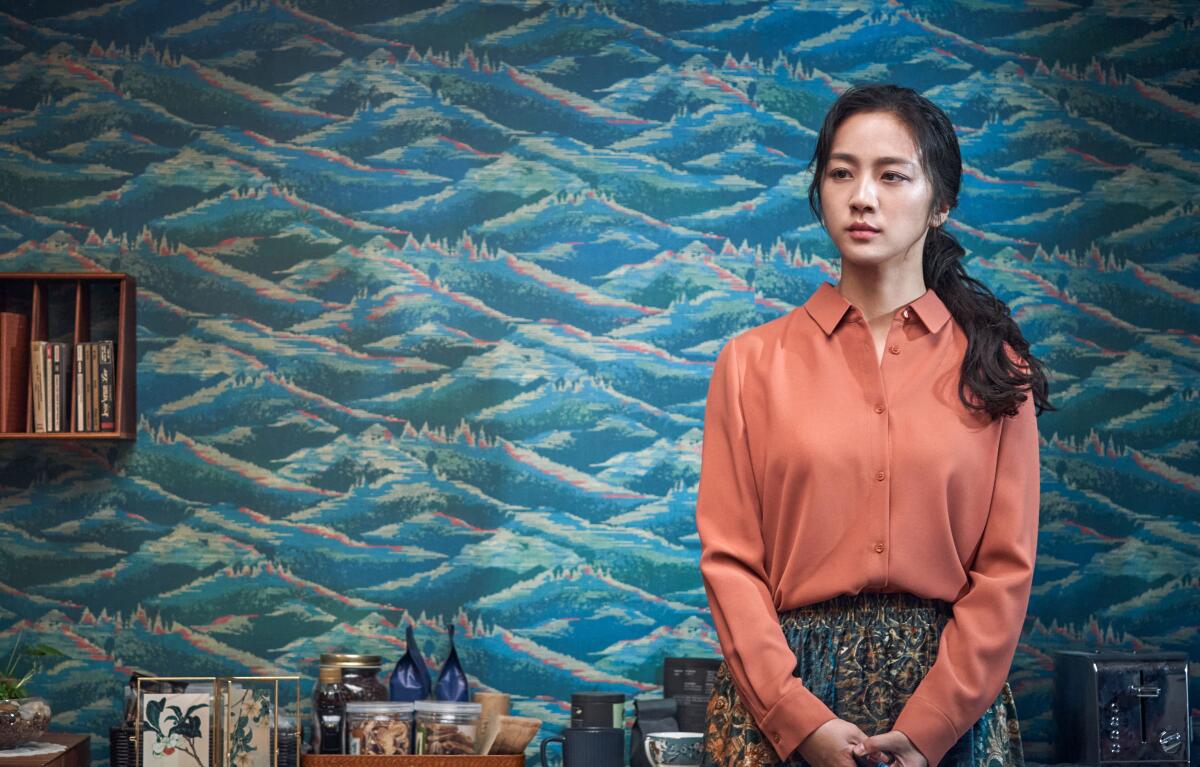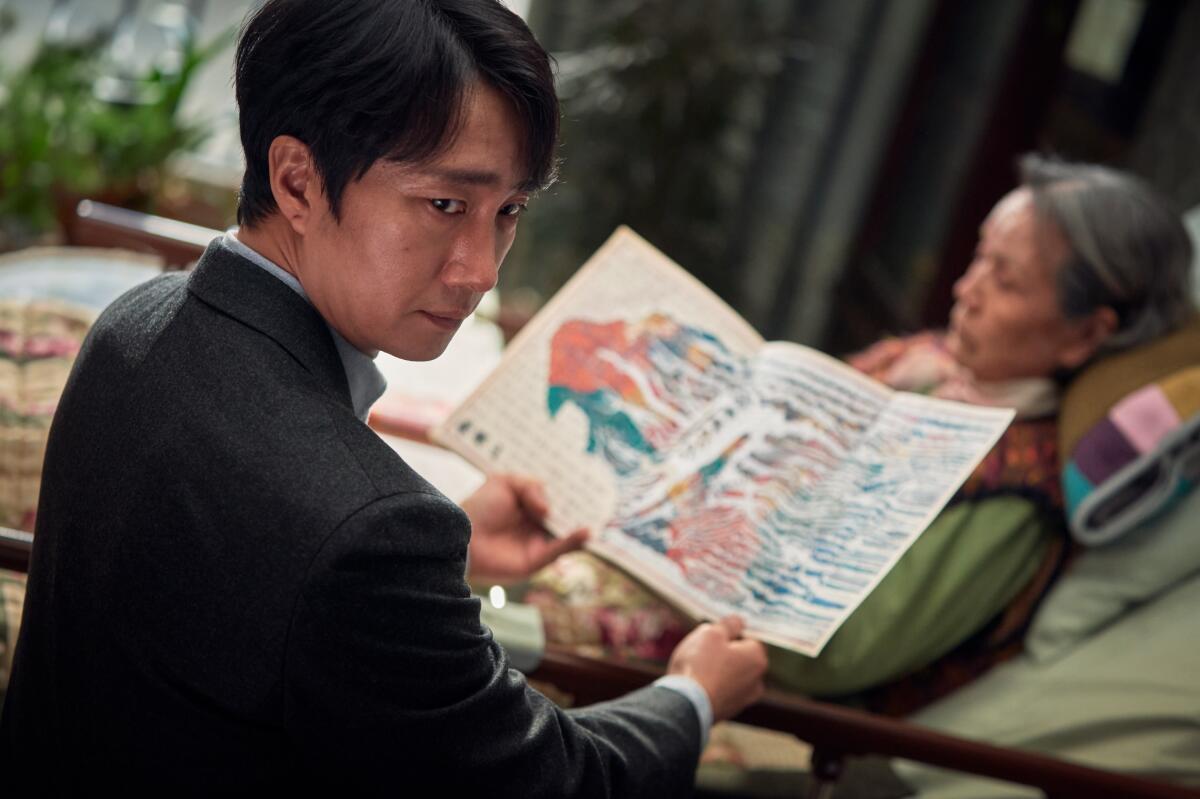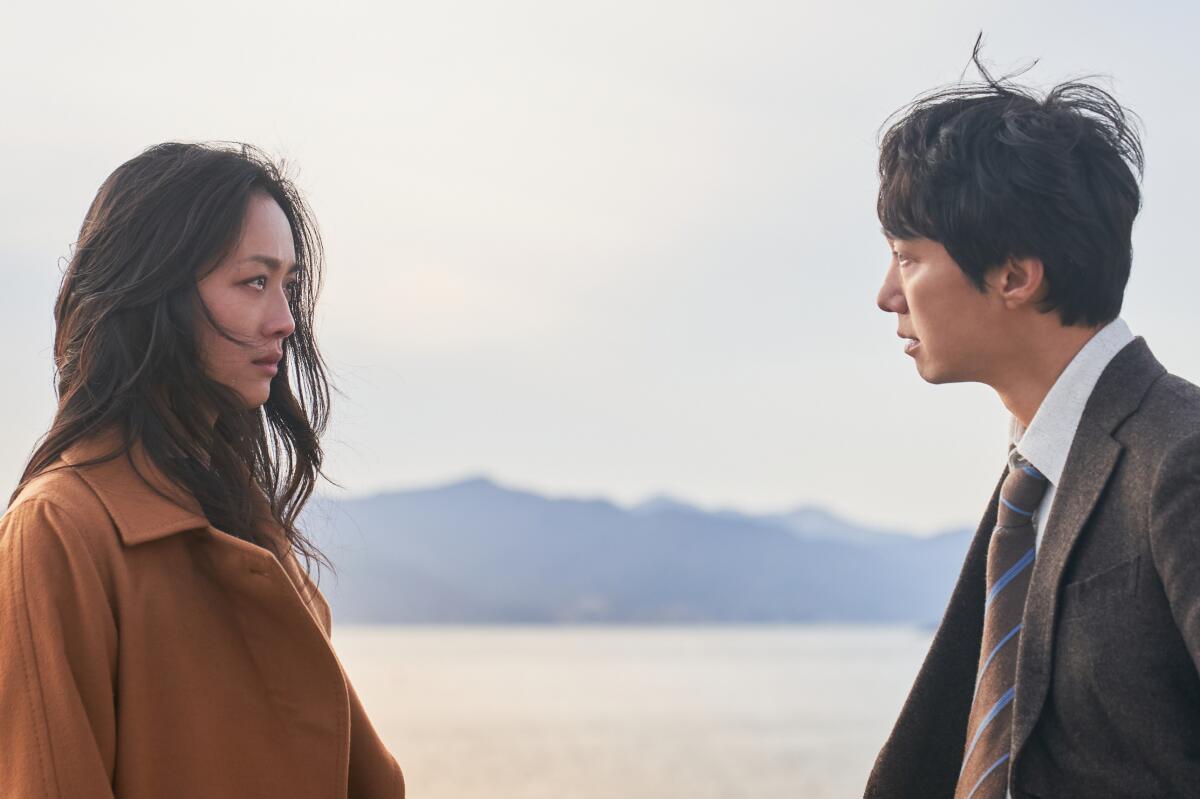Park Chan-wook’s thrilling mystery ‘Decision to Leave’ is noir at its most nourishing

- Share via
At first glance — and it rewards several glances — “Decision to Leave” seems to tell the story of a police detective and the beautiful woman who upends his dull, well-ordered existence. It’s a tale of impossible longing, the kind that can undo a marriage, ruin a career and send ordinary people spiraling into an all-consuming obsession.
But given the formalist bent and sensualist fixations of the South Korean writer-director Park Chan-wook, you might say this double-decker feast of a thriller is also about a few other things: the lingering scent of skin lotion, the hypnotically repetitive patterns of wallpaper and the glistening sheen on a piece of sushi, even under the hard glare of police-station lighting. Park has a thing for beautiful surfaces and also a thing for seafood, as admirers will know from his 2004 breakthrough, “Oldboy,” with its notoriously unsimulated scene of a man inhaling a live octopus. (Harder-core fans might remember “Night Fishing,” the fantastical 2010 short he co-directed about a fisherman and his most unexpected catch.)
For your safety
The Times is committed to reviewing theatrical film releases during the COVID-19 pandemic. Because moviegoing carries risks during this time, we remind readers to follow health and safety guidelines as outlined by the CDC and local health officials.
“Decision to Leave,” which won Park a directing prize at Cannes and will represent South Korea in the Oscars’ international feature race, is a movie of subtler, more luxuriant pleasures. Compared with that unlucky octopus, the sushi here is both ethically sourced and exquisitely plated. And as the movie’s inextricably bound leads, Hae-joon (Park Hae-il) and Seo-rae (Tang Wei), enjoy their meal in easy, companionable silence, you’d be forgiven for assuming they were lovers or spouses, rather than a homicide detective and his prime suspect.

The dead man who’s brought them together is (or was) Seo-rae’s husband, Do-soo, a 60-year-old climbing enthusiast whose corpse has been discovered at the base of a mountain near their home. Seo-rae seems coolly unaffected by this tragedy; returning almost immediately to her job as an elder-care nurse, she notes, “Living old people come before dead husbands.” As it happens, it’s her work that provides her with a solid if not unshakable alibi; she also has bodily bruises and scars that suggest a potential motive. Curiously, this possibility seems to awaken Hae-joon’s protectiveness more than his suspicion. So does the fact that Seo-rae, a Chinese immigrant, speaks limited Korean, something Hae-joon accommodates by explaining rules and procedures as simply as possible.
Voice translation apps also prove handy in a story that Park Chan-wook and his co-writer, Chung Seo-kyung, have conceived as an up-to-the-minute vision of sleuthing in the smartphone era, making ingenious use of lock screens, text messages, audio recordings, Siri voice commands and even exercise trackers. But if technology helps Hae-joon catch killers, it also keeps him in touch during the week with his busy, practical-minded wife (Lee Jung-hyun), who lives in a seaside town a few hours’ drive away. Their long-distance arrangement has worked well so far, Hae-joon’s workaholism and insomnia notwithstanding. He’s the youngest police inspector in his department, and his meticulous, methodical approach to a crime scene demonstrates why. (His younger deputy, amusingly played by Go Kyung-pyo, offers a contrasting study in goofball shtick.)
But it’s precisely Hae-joon’s investigative skills — matched by Park Chan-wook’s own brilliant powers of observation — that wind up throwing him off balance. And Park Hae-il captures the detective’s steady unraveling with a poignancy that’s all the more remarkable for being concealed behind a crisp, efficient veneer. The personal and the professional begin to blur as Hae-joon stakes out Seo-rae’s apartment, an invasion of privacy that she amusedly acknowledges and even welcomes. He’s moved by her many long, lazy nights spent eating ice cream in front of the TV, and he starts finding ways to assuage her loneliness, which are all the sexier for being scrupulously chaste. In time he learns about her family’s history in China and her harrowing years-ago journey to Korea; she was the only refugee of many who wasn’t deported. (Tang’s exquisitely demure siren song of a performance carries some unmistakable subtext: Blacklisted by the Chinese film industry in 2008 after her taboo-shattering turn in Ang Lee’s “Lust, Caution,” the actor found new stardom abroad and particularly in Korea, eventually marrying the Korean director Kim Tae-yong.)

“Decision to Leave” isn’t a refugee drama, per se, though that would certainly be one way to interpret its richly suggestive English-language title. It wouldn’t mark the first time Park Chan-wook has explored questions of national and cultural identity, issues that surface in movies as different as “Joint Security Area” (2000) and “The Handmaiden” (2016), his teasing thriller set in 1930s Japanese-occupied Korea. It’s surely no accident that, even as it busily juggles subplots, perspectives and time frames, “Decision to Leave” returns again and again to the sea, and specifically the image of waves crashing against rocky shores. It’s a poetic motif in a movie about the mystery of where we make our home, and also that strange phenomenon whereby a mysterious stranger can become an inescapable soul mate.
If your mind has turned to “Vertigo,” you’ve surely been paying attention. In scene after gorgeously staged scene (many of them set to Cho Young-wuk’s churning, haunting score), the director unleashes a swirl of associations and allusions to that Hitchcock masterpiece: a fall from a great height, a surveillance subject who becomes a desired object, a romantic-noir template that resets and replays itself halfway through. (Even the story’s occasional creaks and longueurs feel exquisitely “Vertigo”-esque.) A genre maestro with both a flair and a weakness for grandiose stylistic flourishes, Park seizes upon Hitchcock’s aesthetics of voyeurism and desire and pushes them to new extremes of high-tech fetishism. At one point, he conducts a virtuoso mini-seminar on the male gaze, as Hae-joon, spying on Seo-rae from a distance, suddenly imagines himself standing in the same room beside her.

In these moments, “Decision to Leave” seems to be about nothing more (or less) interesting than all the different games that the director and his cinematographer, Kim Ji-yong, can play with the camera. Why not show us how Hae-joon and his wife look from the perspective of, say, an ice-packed seafood display in an outdoor market? (Yes, seafood again; “fish-eye lens” has never been interpreted so literally.) And when Park slips the camera behind the window of a smartphone screen, peering out at Hae-joon from behind a row of typing-awareness-indicator bubbles, the movie’s formal playfulness takes on an eerie, melancholy undertow. It’s as if we in the audience have suddenly been transformed into miniature ghosts in the machine, silently watching as this impassioned and improbable love story unfolds through the banal filters of 21st century tech.
Hae-joon and Seo-rae may be separated by culture, language and cursed circumstance, but the currents of feeling between them are undeniable. At one point, Seo-rae urges the sleep-deprived Hae-joon to set aside the many unsolved crimes memorialized on his evidence wall and allow himself some peace. Is she being sincere in her concern, or is she trying to dupe him? Tang’s performance is both acutely felt and necessarily opaque, and if the movie never quite penetrates Seo-rae’s head and heart, that feels like a built-in flaw in a story about the elusiveness of the pursued and the agony of the pursuer. These may be classic genre formulations, but you can tell from “Decision to Leave,” a love story by turns sprawling, despairing and invigorating, that Park feels them on a molecular level. He doesn’t want the chase — or the movie — to end.
‘Decision to Leave’
Not rated
In Korean and Mandarin with English subtitles
Running time: 2 hours, 18 minutes
Playing: Starts Oct. 14 at AMC Sunset 5; AMC Century City 15
More to Read
Only good movies
Get the Indie Focus newsletter, Mark Olsen's weekly guide to the world of cinema.
You may occasionally receive promotional content from the Los Angeles Times.











